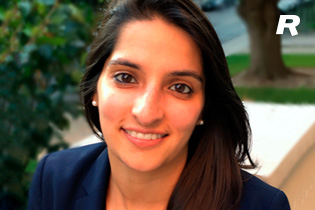 From deciding what to order at dinner to making mortgage decisions to planning for retirement, Avni Shah, an assistant professor of Marketing at the University of Toronto Scarborough and the Rotman School of Management, wants to know more about how we spend money and the social pressures that influence our spending.
From deciding what to order at dinner to making mortgage decisions to planning for retirement, Avni Shah, an assistant professor of Marketing at the University of Toronto Scarborough and the Rotman School of Management, wants to know more about how we spend money and the social pressures that influence our spending.
To get at these answers, she’s observed the behaviours of restaurant diners, analyzed census data and traveled to other countries, like Mexico, to speak to locals about personal finance.
Here are a few key insights that she’s uncovered in her recent research:
We are more likely to eat healthier if we explicitly know that we are being charged more for unhealthy food options.
As obesity rates steadily climb, policymakers have long been interested in which strategy — either an economic approach (e.g. adding a ‘junk food tax’) or a public health approach (e.g. adding a label to unhealthy food) — is more effective in curtailing unhealthy eating behaviours.
To get at the answer, in a 2014 study, Shah and her colleagues worked with one North Carolina restaurant for a month and presented diners with different types of menus.
The researchers found that tables chose healthier options when ordering off a surcharge menu, where diners were told explicitly that they were being charged 15.5 per cent more for meals that had unhealthy amounts of fat and sugar. This effect held up regardless of whether the tables were composed of only men, only women or a mix of men and women. (This is important since researchers know that tables made of up all men tend to opt for unhealthier meals and the opposite is true for tables with only women.)
“We were able to show that combining economic disincentives and public health messaging is key to driving people’s behaviour. This work could inform future health policy work,” explains Shah.
When it comes to making mortgage decisions, neighbours matter.
When it comes to making the biggest financial decision of our lives — buying a home — most of us turn to an unexpected source for advice: our neighbours.
In another study, Shah and her co-author Ben McCartney pored over volumes of Los Angeles census data to uncover patterns related to which mortgage options residents pursued — for example, whether they selected adjusted or fixed rates or chose whether or not to refinance — and which lenders they worked with.
“Our spending decisions are hardly ever just about money.”
— Avni Shah, Assistant Professor, Marketing
They found that households living on the same block tended to make almost identical mortgage decisions. This pattern disappeared when a homeowner had a primary residence elsewhere or was new to the neighbourhood. This all suggests that neighbours talk and seek each other out for financial advice. This is important, says Shah, because much of the work involved in designing financial literacy programs often ignores social forces.
“Many individuals don’t trust banks, but they do trust other people. We can’t discount the value of social networks, influences and community-based approaches in spreading financial information and helping people make better choices.”
We might be better at saving up for retirement if we think about it in terms of our family’s future.
Her current research has also taken her to Mexico, which has the third-worst elderly poverty rate in the world, where Shah and her colleagues at U of T are exploring strategies for incentivizing adults to save for retirement.
“For most Mexican households, there is a strong focus on having money available to spend on their family. In many cases, breadwinners describe how making deposits into their individual savings accounts feels selfish, or like money lost,” Shah explains.
She and her colleagues looked at whether there was a way to reframe the issue so that working adults could start thinking about retirement saving as a means of securing their family’s future.
In their latest work, they found that messaging campaigns aimed at making retirement saving more engaging for family-focused individuals were more effective. During the study, the researchers saw a 45 per cent boost in getting Mexican adults to make voluntary contributions to their retirement funds. This could have implications for encouraging responsible saving in communities that prioritize family welfare over just a lone individual’s economic prosperity.
“Our spending decisions are never just about money,” says Shah. “Humans are social creatures that react to their environment. If we want people to make better, healthier, smarter spending choices, we need to consider their social circumstances and speak to what motivates them.”
Written by Rebecca Cheung | More Rotman Insights »